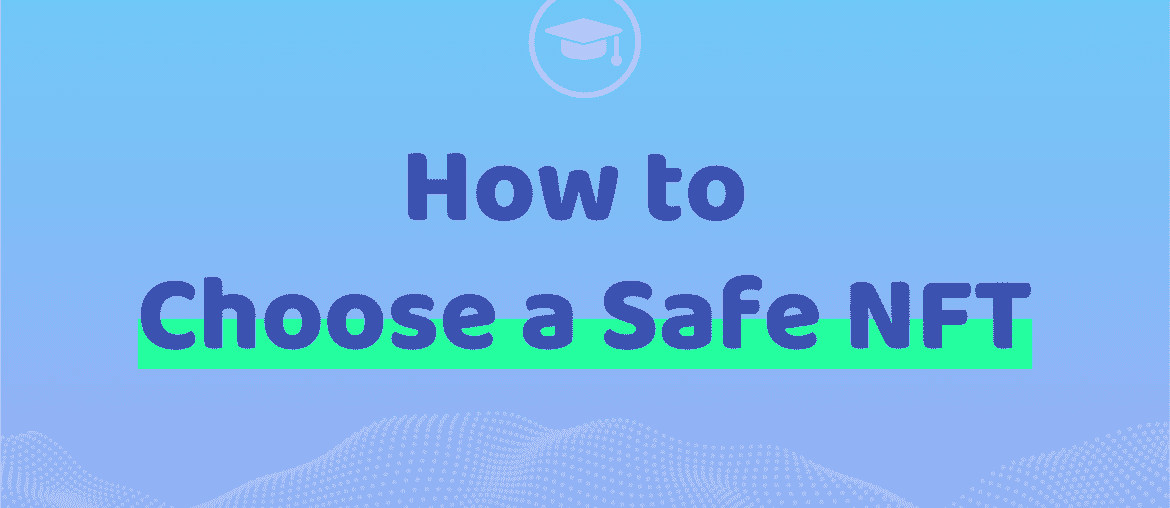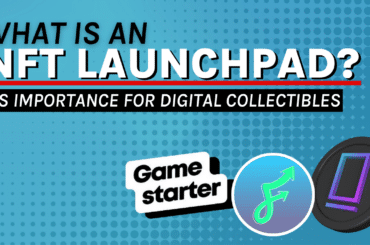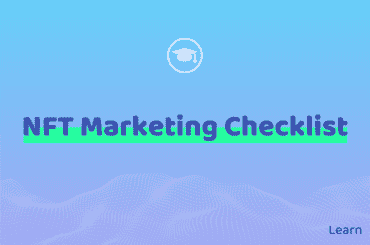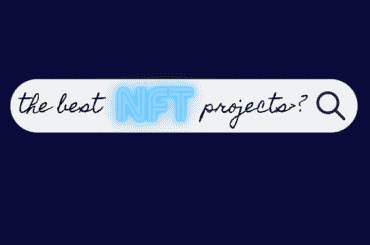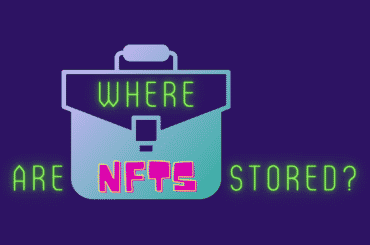Non-Fungible Tokens (NFTs) are a new and exciting way to invest in blockchain technology. These digital assets are unique and can represent a variety of different uses. From virtual game items to real estate, the possibilities are endless. As with anything in life, though, safety is tremendously important so it is imperative you know how to choose a safe NFT, the different NFT wallets as well as how to verify and secure your tokens. So whether you’re just starting in the NFT world or you’re a seasoned pro, you’ll be equipped with the necessary knowledge on choosing a safe NFT.
Table of Contents
Check the Trading History
Many creators will inflate their value by selling NFTs to themselves. The addresses of past owners and purchase dates can be used to determine if prices are wildly inflated.
The “Trading History” section is a great place to research if an NFT is being artificially overpriced. For example, under the “activity” tab you will see (1) if buyers have not made any transactions before, (2) transactions that were made in a short period of time, or (3) if there were only very few sales over time that all came from one buyer who purchased the same token.
Authenticity check
While some platforms require that you provide proof of identity, others don’t. It all depends on the type and nature of NFT desired by users – so do your research!
Some artists and public figures have to go through account verification before they can create non-fungible tokens. At that time, a verification check mark will appear next to their name on the platform.
It is also a good idea to check the specified links to ensure that the NFT is genuine and not a scam. If you are unable to find the information on the indicated pages, then most likely the creator is a scammer.
Smart Contract Verification
When it comes to NFTs, smart contracts are responsible for issuing and managing the rules of digital assets. You can find out which contract was used in making an individual’s unique item by viewing its details under “Contract Address.”
When you click on the Contract Address, the smart contract page will open in the Etherscan blockchain explorer. Unless you have programming knowledge, it is impossible to access the security of a contract. But if you go to the “Comments” tab, you can read the reviews of other users. Negative comments will be cause for concern.
Media File From NFT
The vast majority of NFTs are built on the Ethereum blockchain, which was not designed to upload files; therefore, certain tokens contain only a link to the media file. The images or videos you buy as NFT can be stored anywhere.
The metadata of the media file will tell if the NFT is centralized, whereas the creator cannot change it, or editable in which it can be changed. Not all NFTs hold this information.
A token ID will provide more information about your NFT. The token ID is written below the contract address line in the details sections. This is the serial number of the NFT in the smart contract. If the token ID has too many digits, it will not be displayed in full. Using the URL bar, you can find the full token ID. It will be the last digits in the link starting with the last “/” symbol.
The Contract Address and the Token ID will be needed to find out how securely the file from the NFT is stored.
Choosing an NFT Wallet
When it comes to choosing an NFT wallet, there are a few things you’ll want to keep in mind. Firstly, make sure that the wallet is reputable and has been around for a while. You don’t want to risk your hard-earned tokens on some fly-by-night operation. Secondly, be sure that the wallet is secure. Check to see if it has been verified by a reputable third party and that it uses strong security measures. Finally, make sure that the wallet is user-friendly and easy to use. You don’t want to have to fumble around with complex settings just to access your tokens!
Once you’ve chosen a safe and reliable wallet, it’s time to start thinking about security. One of the most important things you can do is to verify the smart contract behind your NFTs. This will ensure that the code has not been tampered with and that your tokens are safe. You can do this by checking out the contract on a site like Etherscan or MyEtherWallet.
Another thing to keep in mind when it comes to security is backup and recovery options. Make sure that you have a backup plan in case something happens to your wallet (e.g., you lose your phone, get hacked, etc.). And be sure to test out the recovery process before you need it!
Finally, when purchasing NFTs, be sure to use a reputable exchange. Again, check to see if the exchange is verified by a third party and that it uses strong security measures. And be sure to read the fine print before making any trades!
What to Look for in a Wallet?
There are several factors to consider when looking for the perfect crypto wallet. Some things, such as security and durability will be universal across all users while other qualities can vary depending on what you need in your personal experience.
These are several important considerations before making any final decisions:
Security: Two-factor authentication is the most important feature to look for in a wallet. Without it, you’re risking all of your crypto assets and making it easier to gain access to your wallet.
Support for multiple blockchains: The Ethereum blockchain is the most popular blockchain in the NFT market but other blockchains support NFTs too. Choose a wallet that supports multiple blockchains or at least the blockchains that you’re interested in to have access to as many NFTs as you want.
Compatibility with NFT marketplaces: Your wallet should also support the marketplaces where you want to buy NFTs from.
Friendly user interface: Your NFT wallet will interact directly with the blockchain, so a user-friendly interface will make that process much easier so you can buy, sell, and store NFTs effortlessly.
Cross-device use: For ease of use, choose a wallet that can be used on both a desktop and a mobile device.
Credit/ debit card support: Being able to accept direct payments from a debit or credit card is a feature not all wallets offer so, you will need to decide whether that’s a necessity when choosing a wallet.
Bank withdrawal: Another feature to look out for when choosing a wallet is whether you can withdraw funds directly to a bank account.
Types of Wallets
Wallets don’t e technically store NFTs, they are stored on the blockchain network. An NFT wallet provides access to digital assets. You can easily track and display your assets on the blockchain with your NFT wallet.
Wallets also generate a private key to the NFTs blockchain address. A private key is necessary to authorize transactions.
A wallet will ensure the private key stays secure so that no one else can authorize transactions.
Software Wallets
Software wallets are wallets that you can either download as a mobile app, desktop app or use in your browser. These wallets are secured by a password, seed phrase, and 2-factor authentication in some cases.
Since it’s software, these wallets are a lot more accessible than their counterparts. You can access your assets from nearly anywhere.
Software wallets are also very secure utilizing a seed phrase for protection; your wallet isn’t accessible without it. If you lose your seed phrase, you’ll lose all access to your wallet. There’s no “Forget Password” mechanism that will get you back into the wallet.
Popular Software Wallets
Metamask Wallet – Currently the most popular crypto wallet, Metamask is an Ethereum wallet that allows you to buy and sell NFTs on almost any marketplace. It works on both your mobile phone and browser. Metamask also allows users to set up a wallet address for crypto and NFTs separately. One of the most popular functions is the built-in capability to swap out Ethereum tokens. Users can also choose between different gas prices depending on the type of transaction. The Metamask Wallet also supports debit cards and bank transfers in over 60 countries.
Coinbase Wallet – Although Coinbase is primarily known for its cryptocurrency exchange as one of the largest out there, it is also a non-custodial wallet for NFT holdings. With a non-custodial wallet, users have complete control over their digital assets. Instead of public wallet addresses, Coinbase uses the concept of usernames for NFT exchanges making it beginner-friendly. Usernames also provide added security as you can be certain you aren’t sending NFTs to the wrong wallet. The Coinbase wallet, like Metamask, can also be used via mobile app and a browser extension and supports debit and credit card purchases in over 90 countries. In addition, the wallet offers a one-click backup for private keys.
Math Wallet – This option is the perfect choice for users of multiple blockchains as it supports more than 90. It offers a web, desktop, and mobile version for an easy syncing process. Math Wallet integrates with popular hardware wallets like Ledger and Wookong. It also allows for the creation of multiple addresses to keep crypto and NFTs separate. With Math, users can also swap and stake tokens and it also provides its own utility token.
Trust Wallet -Trust wallet is one of the most popular on the Binance Smart Chain, close competition for the Ethereum Blockchain. It does also support Ethereum, Solana, and others as it is a multi-chain wallet. Users trading or collecting NFTs on BSC will find this wallet more favorable because it is owned by Binance. Trust is only available as a mobile app but its simple facilitation allows users to navigate marketplaces with a single click. Surprisingly, the Trust wallet does not allow for NFT transfers; you can only use it to store or manage the assets. Users can purchase tokens with credit or debit cards.
Hardware Wallets
A hardware wallet is a physical wallet where you store your crypto assets, cryptocurrency, and NFTs, offline and are password protected. These types of wallets are known to be the most secure wallets out there.
Keeping your assets offline keeps them secure from hackers. You can also retrieve your wallet’s contents if you lose the device using a seed phrase provided by these wallets.
There are only a handful of hardware wallets on the market currently. When choosing the one that’s best for you, make sure to conduct heavy research.
Buying and Selling NFT Art Safely
When buying or selling an NFT, it’s important to make sure you’re doing so safely and securely.
Just as you would with physical art, with digital art you want to look for well-known, reputable artists. Ensure the artist you’re buying from has a good reputation and is known for creating high-quality digital art.
Always double-check the authenticity of any NFTs you purchase and never share your private keys with anyone, always keeping them safe and secure.
Storing NFT Art
You can store your NFTs in a digital wallet, but make sure it’s compatible with the blockchain network. Even though blockchains are highly secure and offer protection against hackers through encryption technology, there are still precautions you should take to keep them safe from attacks on cryptocurrency exchanges which come without regulations or oversight as well as being free-to-use marketplaces where anyone could target those who don’t know what they’re doing!
In addition to a digital wallet, you can store an NFT on either private or centralized servers. For those looking for more security when it comes down to their investments and storage of valuable data such as cryptocurrencies, there’s Arweave; its purpose isn’t just to provide quick access but also to ensure that no one else besides yourself has permission from this system which means they won’t be able to take any actions with the item unless they have direct control over them (ie delete). IPFS offers something different: peer-to passes through gossip protocols to make sure everyone knows what happened earlier than anybody could have reported
The Best NFT Marketplace
OpenSea is the best place to buy and sell NFTs. It supports more than 150 tokens, making it ideal for beginners who want access without having extensive knowledge of cryptocurrency trading platforms like Coinbase or Binance (which can be difficult if you’re not familiar). Also, creating an account on Open Sea is free!
Can NFT Art be copied?
While it is possible to copy the artwork on an NFT, you cannot claim ownership without buying them. The blockchain ledger keeps each token unique and tracks ownership ensuring the real owner is always known even if the NFT is duplicated; which is why it’s called a non-fungible token.
NFTs and Cryptocurrency
NFTs are similar to cryptocurrency because they both live on the blockchain ledger which shows public records of the NFTs ownership.
You can buy and sell NFTs on cryptocurrency-friendly marketplaces with ease. When you make a purchase, the payment will need to be made in Ethereum (or another supported crypto).
The most popular way for people to securely store their digital assets is by using an online wallet system that allows users complete control over the process.
NFTs as an Investment?
The rise of the new economy is upon us, and it’s bringing with it exciting opportunities for investors. In recent years we’ve seen more people turn their attention from traditional markets like stocks or bonds to a cryptocurrency–and now blockchain-based digital assets known as NFTs.
Unlike other types of investments that fluctuate based on market trends alone; each NFT carries its unique value because there’s no one else selling exactly what they offer! This means demand will increase as well thanks not just to those looking at investment returns but also how rapidly prices can change within this emerging sector – meaning if you buy early enough your profits may skyrocket later down.
With the increased popularity of NFTs, hackers are also becoming more interested. To protect yourself from online threats you must implement some simple security practices when investing or trading with blockchain networks so they don’t steal your money forever!
In Conclusion
Now that you know all about NFTs, it is important to learn how to keep them safe. By following these simple tips, you can ensure your investment is protected and will continue to grow in value. Remember, safety first when it comes to your hard-earned money!

